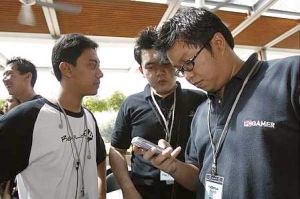Among Asia Pacific countries, Malaysia was ranked 28th out of 40 and we trailed behind Pakistan and Cambodia.
In 2005, Malaysia was ranked 152nd globally and 33rd regionally, which means there is a slight rise up the notches.
But that’s not really good enough. We should not compare ourselves with China, North Korea, Myanmar, Iran and Brunei. Thankfully, no politician has attempted to make such warped comparisons.
 |
|
Widening scope: From mobile telephones to computers, which are getting smaller, providing news would no longer be the monopoly of professional journalists but ordinary Net users as well. — Filepic
|
For practical reasons, no Malaysian media company would want to be in the same category as Timur Leste or Papua New Guinea, even if they are ranked higher than Malaysia, as the advertising index is almost non-existent.
Similarly, press freedom has little meaning if journalists always end up in the morgue, like in the Philippines, Cambodia or Thailand.
Still, the cry for greater press freedom is getting louder. It would be foolish for anyone to stifle press freedom, especially among the mainstream media because some politicians want to control what the public think or read.
It is no longer possible as the broadband becomes faster on the Internet and our sources of information widen.
The newspapers would be just one source of information because media companies, as content providers, would also use other media to relay information.
From mobile telephones to computers, which are getting smaller, providing news would no longer be the monopoly of professional journalists but ordinary Net users as well.
Bloggers have become a source of information. Many may be opinionated and their information may not be accurate, given their lack of resources, but they provide an alternative.
Many have raised pertinent issues and asked good questions, which make us think harder. Many former journalists-turned-bloggers have proven that they still have the network of contacts to help them break news.
Every Malaysian is entitled to provide a viewpoint and if we do not agree, we engage in a discussion; it is really up to us to provide the best answers or opinion.
Young Malaysians cannot be blamed if they perceive that many of our leaders have not grasped the workings of the Internet. The statements of some politicians have only reinforced this assumption.
In Malaysia, it is unfortunate that blogging is regarded as online political writing. The fact is that Technorati, a directory for 55 million bloggers, shows that food and technology bloggers are at the top. It is only followed by politics and public relations.
The trend is probably similar in Malaysia, too. Personal entries, a modern form of diaries, probably make up the largest number of bloggers, especially among students.
Our politicians need only find out from their children or grandchildren how many of them are bloggers. Then, maybe, they would want to stop talking about registering bloggers.
Still, it cannot be denied that under the Abdullah Administration, the Prime Minister has allowed greater democratic space and tolerance for dissent.
It is thus unfortunate that some bloggers have made heroes of political players who had suppressed the media when they were in power. Many of these figures lack the credibility to talk about press freedom and when they do so, they smack of hypocrisy.
Some are turning to the new media and have complained about media blackout when they, too, had used the same tactics to shut out their opponents.
Many bloggers, unfortunately, are much too young to realise this or they have chosen to look the other way for political expediency.
Some bloggers write about press freedom and yet display blatant intolerance of others who don’t share their political views.
Posting daily comments against a personality with unsubstantiated allegations is not press freedom because that’s a personal vendetta or campaign.
For those in power now, Malaysians hope they will not end up in the same way. They have the opportunity to change things in our country and certainly they would want us to judge them with greater honour.
The rules have changed because of the Internet and many of the laws affecting the media are no longer relevant.
The number of Internet users in Malaysia may be small but it will explode. Nobody needs a printing permit to set up a website and with the Internet Protocol television coming our way, anyone can broadcast news with just a video camera.
Malaysians will also ask why they can watch on al-Jazeera the twilight lives of ex-Communist Party of Malaya leaders or an apostasy case involving a Malaysian Muslim when such subjects are frowned upon by the authorities in newspapers.
Amir Muhammad, who has made two movies about the ex-CPM members, would also wonder why since all one has to do is to go to www.youtube.com to catch his work.
Many subjects remain sensitive simply because we still carry the baggage of history. Young Malaysians have a right to question why the discussion of the Constitution and our rights, either relating to religion or as citizens, should be deemed sensitive.
Malaysia should stop talking about regulating the traditional media and instead allow Malaysians to articulate and engage in issues because they are hotly debated with just a click in the new media.
Our politicians must learn to trust our newspaper editors and journalists, as much as they want us to trust them.





